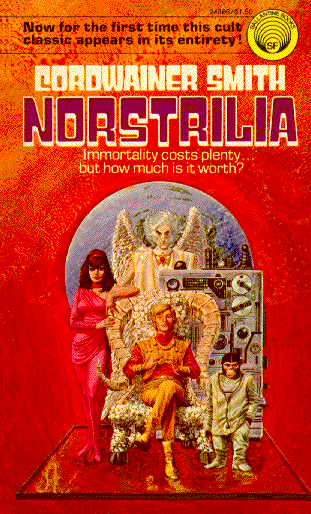When I was a teenager, my brother introduced me to a set of books by a writer with a goofy name, Cordwainer Smith. The first was a short story collection called The Instrumentality of Mankind, and the other was a novel called Norstrilia. My mind was blown. These stories, published in the 50s and 60s, were breathtaking in the wildness of their vision. They were almost psychedelic in their strange settings, technologies, and characters. The predicaments of those characters were beyond the scope of anything in the 20th century, yet strangely touching.
Today I learned that many of his works are in the public domain and available through Project Gutenberg. Here’s a link to A Planet Named Shayol, one of my favorite sci-fi short stories ever. Smith’s imagining of a galactic gulag serves as a fine analog to hell. Here’s a small snippet:
Mercer said, “Before I put the cap on, can you tell me what happens down there?”
“Some of it,” said the doctor. “There is an attendant. He is a man, but not a human being. He is a homunculus fashioned out of cattle material. He is intelligent and very conscientious. You specimens are turned loose on the surface of Shayol. The dromozoa are a special life-form there. When they settle in your body, B’dikkat—that’s the attendant—carves them out with an anesthetic and sends them up here. We freeze the tissue cultures, and they are compatible with almost any kind of oxygen-based life. Half the surgical repair you see in the whole universe comes out of buds that we ship from here. Shayol is a very healthy place, so far as survival is concerned. You won’t die.”
“You mean,” said Mercer, “that I am getting perpetual punishment.”
“I didn’t say that,” said Doctor Vomact. “Or if I did, I was wrong. You won’t die soon. I don’t know how long you will live down there. Remember, no matter how uncomfortable you get, the samples which B’dikkat sends up will help thousands of people in all the inhabited worlds. Now take the cap.”
“I’d rather talk,” said Mercer. “It may be my last chance.”
The doctor looked at him strangely. “If you can stand that pain, go ahead and talk.”
“Can I commit suicide down there?”
“I don’t know,” said the doctor. “It’s never happened. And to judge by the voices, you’d think they wanted to.”
“Has anybody ever come back from Shayol?”
“Not since it was put off limits about four hundred years ago.”
“Can I talk to other people down there?”
“Yes,” said the doctor.
“Who punishes me down there?”
“Nobody does, you fool,” cried Doctor Vomact. “It’s not punishment. People don’t like it down on Shayol, and it’s better, I guess, to get convicts instead of volunteers. But there isn’t anybody against you at all.”
“No jailers?” asked Mercer, with a whine in his voice.
“No jailers, no rules, no prohibitions. Just Shayol, and B’dikkat to take care of you. Do you still want your mind and your eyes?”
“I’ll keep them,” said Mercer. “I’ve gone this far and I might as well go the rest of the way.”
“Then let me put the cap on you for your second dose,” said Doctor Vomact.
The doctor adjusted the cap just as lightly and delicately as had the nurse; he was quicker about it. There was no sign of his picking out another cap for himself.
The inrush of pleasure was like a wild intoxication. His burning skin receded into distance. The doctor was near in space, but even the doctor did not matter. Mercer was not afraid of Shayol. The pulsation of happiness out of his brain was too great to leave room for fear or pain.
Doctor Vomact was holding out his hand.
Mercer wondered why, and then realized that the wonderful, kindly cap-giving man was offering to shake hands. He lifted his own. It was heavy, but his arm was happy, too.
They shook hands. It was curious, thought Mercer, to feel the handshake beyond the double level of cerebral pleasure and dermal pain.
“Good-by, Mr. Mercer,” said the doctor. “Goodby and a good good night…”
A small taste. If you have room on your TBR pile, if you love science fiction that is insanely imaginative, explore the works of Cordwainer Smith.
Hi Ho.

